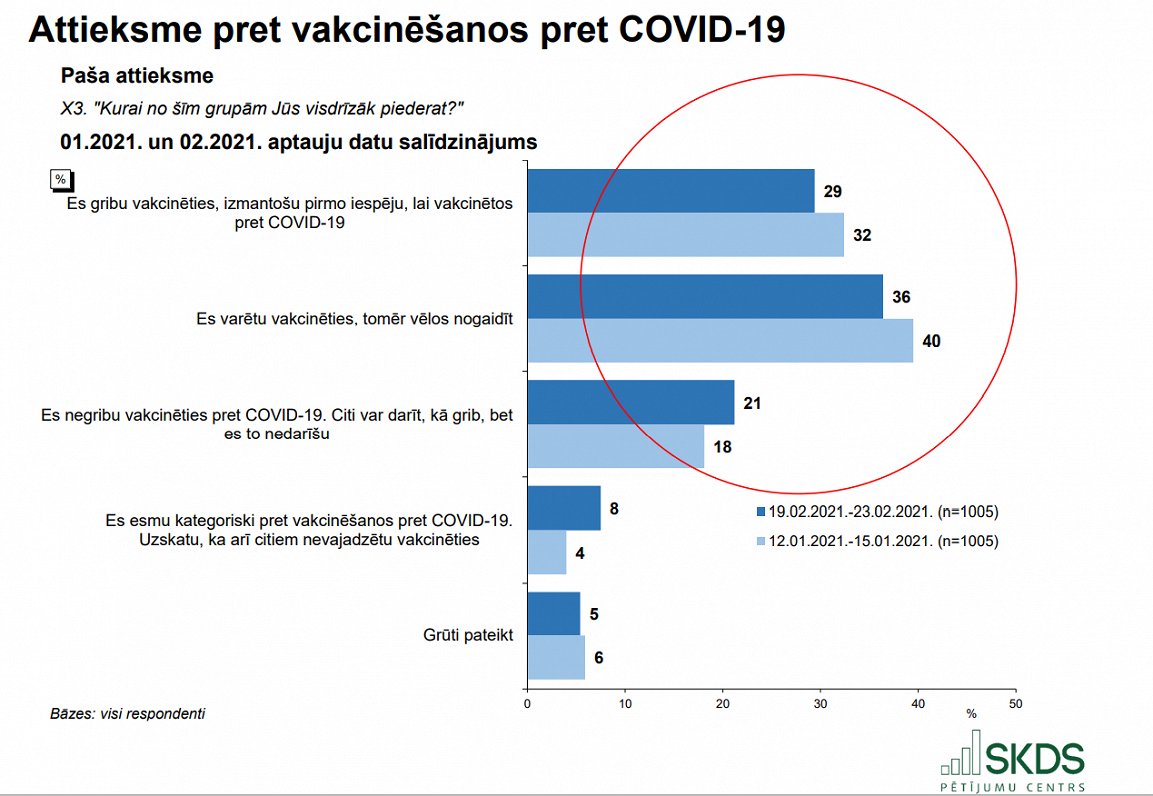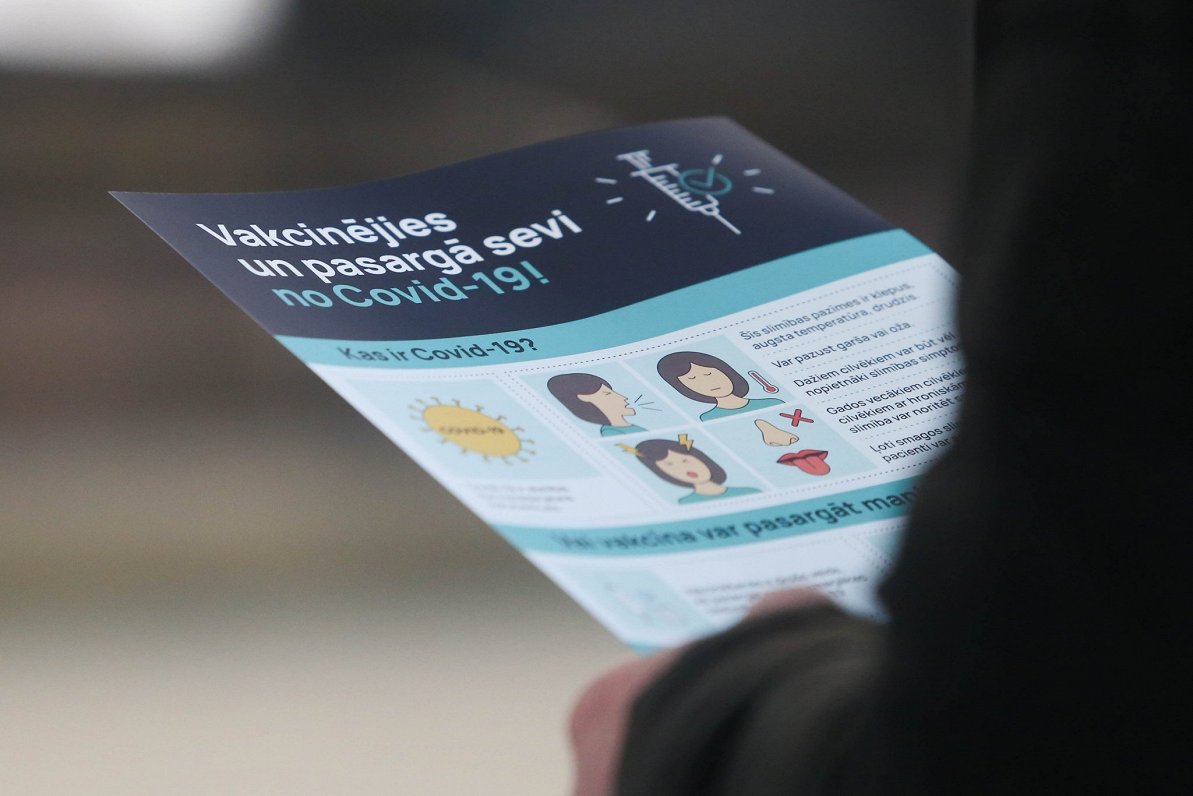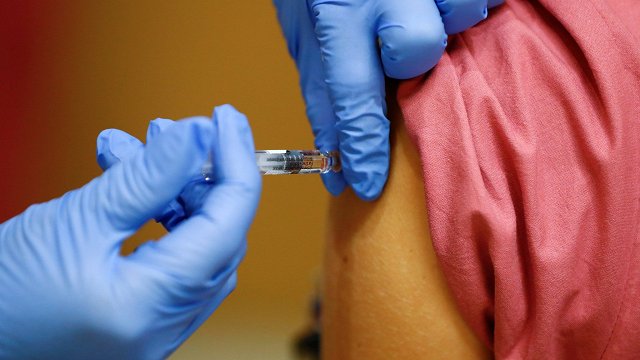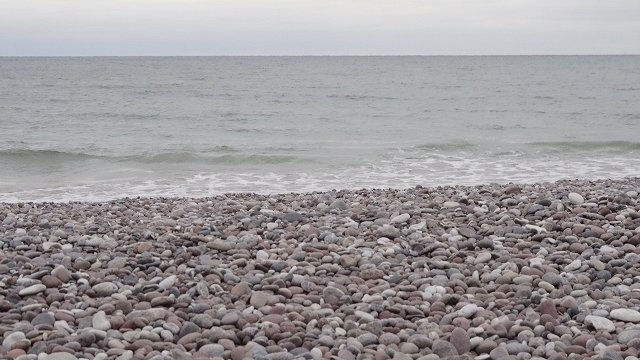SKDS surveyed 1,005 Latvian residents aged 18 to 75 on the Internet from February 19 to February 23.
29% of Latvia's population plan to use the first chance to vaccinate against Covid-19, whereas 36% of respondents indicated that while they intend to be vaccinated, they still want to wait.
21% of those surveyed have indicated they are reluctant to be vaccinated, but believe others can do as they wish. A relatively small number of respondents - 9% - are strongly opposed to vaccination and have expressed the view that others should not be vaccinated either, according to the survey.
Only 5% of those surveyed said it was difficult to answer.

In this survey, the number of respondents planning to use the first chance of being vaccinated against Covid-19 decreased by 3% compared to the period from January 12 to January 15, when 32% of respondents said they would do so.
Over that period, the number of respondents categorically opposed to vaccination who think that others should not get it increased: from January 12 to January 15, 4% of the population responded this way and 9% of the population chose the response now.
23% of Latvian residents would like to choose a vaccine against Covid-19.
20% of respondents indicated that they would only be vaccinated if they were able to choose a specific vaccine against the virus. 28% of respondents said they did not want any vaccines against Covid-19.
44% have indicated that they would like to be vaccinated with the vaccine Sputnik V, 30% with the “Comirnaty” vaccine produced by Pfizer/BioNTech, 19% with the Moderna vaccine. Only 6% of respondents indicated that they would like to choose the AstraZeneca vaccine.
47% of the population responded that the country of production was essential.
16% of the surveyed population have indicated that they feel that components of vaccine are important, for 10% - it is important that the vaccine has been developed using mRNA technology, 5% - it is important that the vaccine has been developed without the use of mRNA technology. It is important for 2% of the population to choose the most expensive possible vaccine, but for 1% it is important to be the cheapest possible vaccine.
When analyzing data on reasons that discourage respondents from vaccinating against Covid-19, 62% mention they want to see how the vaccine works, what its side effects are. The same number of respondents pointed out that the vaccines offered were under-tested. Meanwhile, 37% of those surveyed want more information on vaccines.
17% of respondents believe that many doctors, experts, are against vaccination, while 14% have indicated that Covid-19 is not such a serious disease as to require vaccination. 13% indicated that they were in general opposed to vaccination. The same number of respondents have pointed out that they do not like visiting medical authorities at all and do not like getting a jab.
10% of respondents believe that a high-quality vaccination process cannot be achieved, 9% have indicated that they are not advised to vaccinate because of their health state. On the other hand, 8% believe that they do not need to be vaccinated and that there is a very low risk of being in contact with an infected person.
8% of the respondents have indicated that many people are against the vaccine, 7% have indicated that they believe it is better not to get vaccinated. 3% have pointed out that they have difficulty getting to where they can get vaccinated. 2% of respondents have indicated that their doctor does not recommend vaccination.
The public is increasingly critical of the information provided by the government in the Covid-19 crisis, according to the survey.
65% of respondents say they are tired of the Covid-19 news, which increased by nine percentage points compared to the January survey.
42%, on the other hand, say they no longer know what to believe. In January, 33% of respondents said so.































